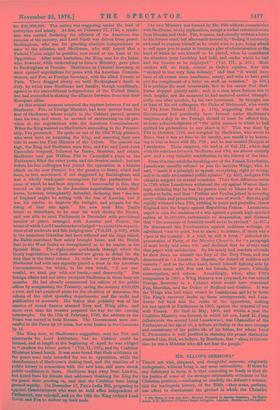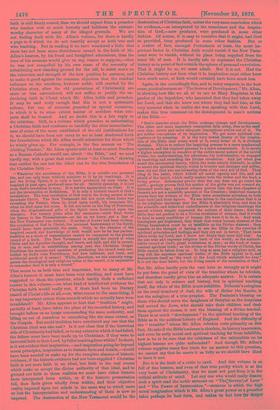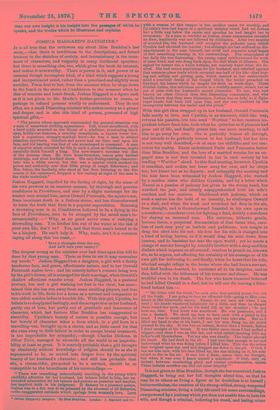MR. ALLON'S SERMONS.* THESE are wise, eloquent, and thoughtful sermons,
singularly undogmatic, without being in any sense rationalistic. If there be any deficiency in them, it is that conceding so freely as they do the justice of some of the stronger rationalistic criticisms on the Christian position,—confessing so candidly the defective science, and the inadequate history, of the Bible, —they make, perhaps, less effort to discriminate the ground in which the Christian
* The Pigott of God, and other Sermons Preached on Special aragOlit. By Henry Alton, DD., Minister of Union Chapel, Iulington. London: Hodder and Stoughton
faith is still firmly rooted, than we should expect from a preacher who teaches with so much honesty and boldness the untrust- worthy character of many of the alleged grounds. We are not finding fault with Mr. Allon's volume, for there is hardly a page in it which we do not heartily accept as both true and wise teaching. But in reading it we have wondered a little that there has not been more disturbance caused in the faith of Mr. Allon's hearers, by his frank and farsighted admissions, than the tone of his sermons would give us any reason to suppose,—that he was not compelled by his own sense of the necessity of substituting new standing-ground for the old, to insist more on the coherence and strength of the new position he assumes, and to make it good against the common objection that the residual influence on the emotions, however noble, still exerted by the Christian story, after the old guarantees of Christianity are more or less surrendered, will not suffice to justify the un- doubting faith in Christ which Mr. Allon holds and preaches. It may be said truly enough that this is not a systematic volume, but one of sermons preached on special occasions, in which it is to some extent matter of accident what sub- jects shall be treated. And no doubt this is a fair reply to the criticism. Still, in a volume which preaches so unhesitating a Christian faith and confesses so candidly the utter inconclusive- ness of some of the most established of the old justifications for it, we should have been not sorry to see at least shadowed forth the foundations which Mr. Allen would substitute for those which he wisely gives up. For example, in the fine sermon on "The Abiding Teacher," Mr. Allon speaks with at least as much freedom as a Roman Catholic would use, about the Bible," and we need hardly say, with a great deal more about "the Church," showing that neither the one nor the other can be the true foundation of the Christian faith :—
" Whatever the excellency of the Bible, it is outside our personal life, and can only from without minister to it by its teachings. It is not the living Spirit, it is only a book produced by men whom he inspired in past ages, produced once for all. Strictly speaking, it is not even God's revelation to man. It is not the appearance on Sinai. It is not the incarnation at Bethlehem. It is only a historic record of God's revelations. The true revelation of God was in the living person of the incarnate Christ. The New Testament did not exist when Jesus was revealing the Father, when he lived upon eartE, his incarnate life, when he died upon the cross. It did not exist on the Day of Pentecost, when the dispensational gifts of the Spirit were bestowed upon the disciples. For twenty years after the ascension—until Paul wrote his letters to the Thessalonians—so far as we know, not a line of the New Testament was written. If no line of it ever had been written, the revelation of God in Christ, the personal bestowment of the Spirits would have been precisely the same. Only, in the absence of the inspired record, our knowledge of both would now be far less perfect: tradition as a mode of transmission cannot be compared to the precise record of a book. The New Testament is simply the record of what Christ and his Apostles thought, and knew, and said, and did in reveal- ing to men and in establishing among men the Christian Gospel. Doubtless the manner and measure of producing the record were con- trolled by God's wise Providence, but how informal, and local, and accidental much of it seems! While, therefore, we can scarcely exag- gerate the theological and religious value of the record, it is imperative to remember that it is only a record."
That seems to us both true and important, but to many of Mr.
Allon's hearers it must have been very startling, and must have suggested to them the question, which hardly finds a sufficient answer in this volume,—on what kind of intellectual evidence the Christian faith would really rest, if there had been no literary mord of Cliiiiit'fi life at a11,—or, what domes to the same thing, if to any important extent those records which we actually have were invalidated? Mr. Allen appears to hint that " tradition " might, partially at least, have taken the place of the recorded history, and brought before us an image commanding the same authority, and lifting us out of ourselves to something like the same extent, as the Gospels. But could tradition have convinced any one that the Christian ideal was also real ? Is it not clear that if the historical side of Christianity had failed, or to any extent to which it had failed, the failure must have been made up to Christians, if they were to have real faith in their Lord, by fuller teaching from within? In short, is it not evident that inspiration,—and inspiration going far beyond moral principles, inspiration as to historic facts and details,—would have been needed to make up for the complete absence of historic evidence, if the historic evidence had not been supplied? Christian faith is not mere faith in an ideal, but faith in the real events which make us accept the divine authority of that ideal, and to
ground our faith in those realities we must have either historic facts interpreted from within, or if the historic presentation fail, then facts given wholly from within, and their objective reality imposed upon our minds in the same way in which more or less the interpretation and understanding of them is now so imposed. The destruction of the New Testament would be the
destruction of Christian faith, unless the verysame conviction which its ovidence,—as interpreted by the conscience and the inspira- tion of God,—now produces, were produced in some other fashion. Of course, it is easy to conceive that it might, had God so provided, been produced in some other fashion. But as a matter of fact, amongst Protestants at least, the most im- portant factor in Christian faith would vanish if the New Testa- ment were to vanish, without its place being supplied from the inner life of men. It is hardly safe to represent the Christian history as in point of fact outside the sphere of personal conviction. That it might be so, we must admit. But it is not. Had the Christian history not been what it is, inspiration must either have been much more, or faith would certainly have been much less.
Again, in the exceedingly fine, and in many respects, in the best sense, poetical sermon on "The Sorrow of Development," Mr. Allon, in showing how like we all of us are to Mary Magdalen in the garden of the Sepulchre, who lamented that they had taken away her Lord, and that she knew not where they had laid him, at the very moment when in reality she was speaking with that Lord, makes this true comment on the development in man's notions of the Bible :—
"Men's theories about the Bible undergo change and development. The older and more imperfect conception falls away, dies as the seed corn dies ; newer and more adequate conceptions evolve out of it. We get nobler conceptions of its inspiration. We get more spiritual con- ceptions of its meaning. It is the very lowest theory of the inspira- tion of the Bible that every word of it, every letter of it, is divinely dictated. This is to reduce the inspiring process to a mere mechanical operation, and the inspired penman to a mere amanuensis. It is surely a higher conception to conceive of the entire moral nature of the sacred writer, his understanding, his affections, his individuality, as engaged in receiving and recording the Divine revelation. And yet when you assail the mechanical theory, which the facts utterly discredit, in order to assert the spiritual theory, which is broader and stronger and nobler, men cry out that you are bereaving them of the very ark of God. They cling to the letter, which killeth all moral agency and life, and are afraid of the Spirit, which really makes both the writer and the book a living power. Astronomy proves that the sun does not go round the earth ; geology proves that the matter of the globe was not created six thousand years ago ; physical science proves that the first chapters of Genesis are not a scientific account of the Creation ; historical research proves that the writers of the Bible were sometimes mistaken in both their facts:and their figures. We are driven to the conclusion that it is in its religions teachings that the Bible is absolutely true, and that in the scientific and historical embodiments of the religions teachings the sacred writers simply expressed the notions of their times ; that the Bible does not profess to be a Divine revelation of science, that it would be fatal to many conditions of human life were it to do so. And weak theologians get frightened, they think that every human element of the Divine Incarnation must be as infallible as the Divine element ; they tremble at the thought of having to use the Bible in the exercise of spiritual principles and feelings, and they cry out in terror, 'They have taken away my Lord, and I know not where they have laid him.' As the one true and supreme religions book of the world; as the authori- tative record of God's great revelations to men ; as the book of trans- cendent spiritual truth; as the shrine of the Divine words of Christ, the Bible cannot be taken from us. So long as man has a religious soul, so long will the supreme spiritual truths of the Bible appeal to it, and demonstrate itself as 'the word of the Lord which endareth for ever.' It is not the dead letter, but the living oracle of the revelation of God."
But Mr. Allon hardly puts the case here as strongly as it might be put from the point of view of the trembler whom he rebukes, and therefore hardly gives him an adequate answer. It is certain that not only in science and history, but in spiritual teaching itself, the whole of the Bible is not infallible. Deborah's eulogium on the cruel treachery of Jael, the wife of Heber the Kenite, is not the eulogiwn of a true prophet. The Psalmist's blessing on those who should serve the daughters of Babylon as the Assyrians had served the Jews, who should take their children and dash them against the stones, is not the blessing of a divine teacher. There is as much " development " in the spiritual teaching of the Bible as in the political history of England. And the difficulty of the " trembler " whom Mr. Allon rebukes rests primarily on this fact. lie asks if the Bible's science is obsolete, its history inaccurate, and even its early moral and spiritual teaching far from infallible, how is he to be sure that the criticisms of the rationalists on its highest lessons are quite unfounded? And though Mr. Allon's volume supplies many fine hints for an answer to this question, we cannot say that he meets it as fully as we should have liked to have it met.
But it is the fault of a critic to cavil. And this volume is so full of fine lessons, and even of that true poetry which is at the very heart of Christianity, that we must not part from it in the critical attitude of mind. Let any one who would really disarm such a spirit read the noble sermons on " The:Service:of Love" and "The Power of Intercession,"—sermons in which the high
moral imagination which is Mr. Allon's great power as a preacher takes perhaps its best form, and makes us feel how far deeper
than our own insight is his insight into the passages of which he speaks, and the truths which he illustrates and explains.








































 Previous page
Previous page